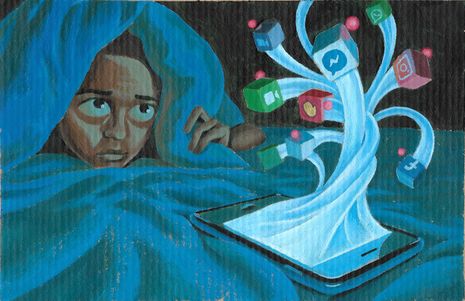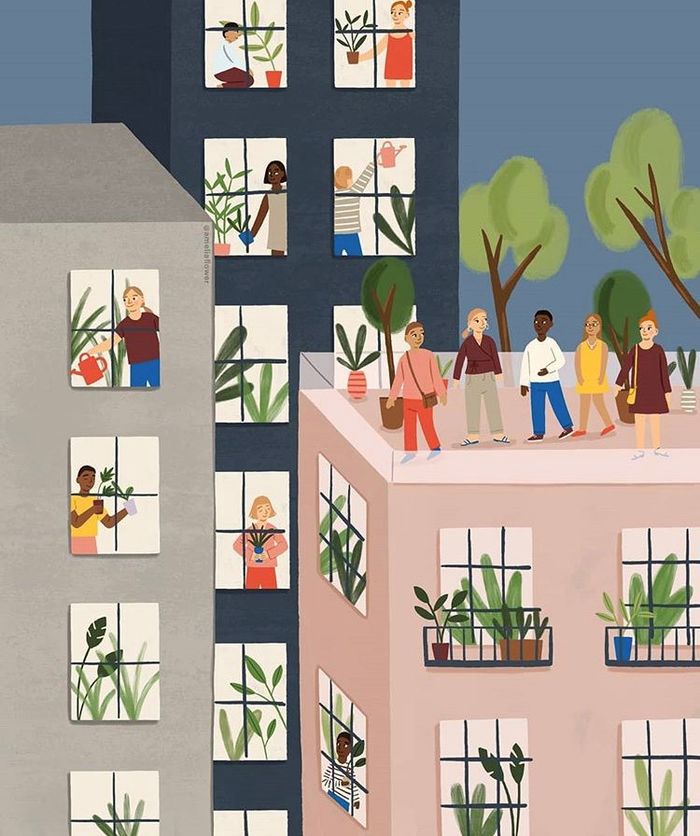A love letter to logging off
Exploring the chaos of constant connection, Ella Gold, discusses the pressure to keep our devices, as well as ourselves, always switched on

When we first all found ourselves locked down in our separate homes, the Internet seemed to explode. Endless Facebook groups, online yoga classes, weekly quizzes and Netflix watch parties inundated our feeds. Instagram tagging challenges involving running, drinking and posting silly photos lined up in little bubbles at the top of my screen and I watched them all. I found myself redownloading Houseparty, my most used app back in 2015, and finding the best spots in my house for the nightly calls. My group chats were more active than they had ever been before. My phone became my vital window of connection to all my friends and the outside world, and as the hours I spent with my eyes glued to the tiny screen rose each day, I did not even feel my usual guilt at such a fixation.
Two months later, and my perspective has shifted in a way I could not have predicted. The guilt I used to feel at being on my phone too much is now something I feel for not being on it enough. The number of days it takes me to reply to a message only increases, and each FaceTime call I do not answer, or reply I have to preface with an apology, only perpetuates the feeling that I am socialising inadequately.
"I genuinely love messaging my friends and speaking to them online. But, at the moment, almost the entirety of our lives exist on the same small screen. "
Physical separation comes with a silent expectation of remaining constantly in touch. There is a pressure to spend more time on video calls, to reply to messages quicker than ever before, because what else could you possibly be doing? This is an attitude to which we have all become unwitting victims, and it is one I feel that we really ought to break. I’m sure I am not alone in feeling often overwhelmed by the pressures of my online presence. Over the years, liking a post has shifted from a genuine expression of enjoyment to an expectation of friendship, and ‘ghost’ has become a label of judgement for those whose virtual engagement is deemed not active enough. This compulsion to see and be seen on social media is certainly nothing new. But in a suddenly time-abundant world, one which exists more online than it ever has done before and probably – hopefully – ever will again in our lifetimes, this problem has only been exacerbated.
The important fact that I am still struggling to come to terms with is that I do not need any kind of excuse in order to be inactive online. There should be no shame in being a ‘ghost’, in taking multiple days to reply to messages in order to wait until you feel ready to face them, or even deleting your social media accounts altogether. I long for the day when I can decline a call even if I’m doing nothing except lying in bed. I long to be able to reply to a (non-urgent) message days later without feeling the need to lie that I hadn’t seen the message, or that I have not had a spare minute to respond to it. Sometimes these things are true, but often they are not. And that should be entirely okay.
I genuinely love messaging my friends and speaking to them online. But, at the moment, almost the entirety of our lives exist on the same small screen. Many people have coined the term ‘Zoom fatigue’, but I think this feeling extends to all corners of our online presences. During term time, socialising is something we are used to navigating in various places, manners and ways. We learn in a supervisor’s office, or a lecture hall. We see college friends in each other’s rooms, at bops, or formals. Morning socialising takes place in cafes for brunch, while at night we head to pubs and clubs. Family are seen on trips home or spoken to on the phone.
These are the unspoken rules which hold our precarious social lives in perfect equilibrium. During such times, it does not matter so much if a message is not instantaneously responded to because, chances are, we will soon see that person, who we may have unintentionally neglected online, in real life and be able to have a proper conversation with them. But with all these methods of socialising compressed in to one tiny device, it is perhaps unsurprising that a phone full of unopened messages can feel, at times, like the scariest thing in the world. The contexts in which we socialise are so important to the act of socialising itself, and, with all of this stripped away, I think we could be more forgiving of the difficulties of jumping from one social situation to another at the click of a button.
Next time you get annoyed at a friend for taking a while to get back to you, next time you find yourself picking from that all-too-familiar list of excuses before drafting your guilt-ridden reply, stop and ask yourself this: is this expectation of perpetual availability actually doing any of us any good? Socialising is no exact science. Supporting your friends and feeling present in each other’s lives is such an important thing. But when staying in constant contact becomes overwhelming, sometimes you can be a better friend if you allow yourself a bit of breathing space. Your friendships will still be there when you come back.
 News / Hundreds of Cambridge academics demand vote on fate of vet course20 February 2026
News / Hundreds of Cambridge academics demand vote on fate of vet course20 February 2026 News / Judge Business School advisor resigns over Epstein and Andrew links18 February 2026
News / Judge Business School advisor resigns over Epstein and Andrew links18 February 2026 News / Petition demands University reverse decision on vegan menu20 February 2026
News / Petition demands University reverse decision on vegan menu20 February 2026 News / CUCA members attend Reform rally in London20 February 2026
News / CUCA members attend Reform rally in London20 February 2026 News / Caius students fail to pass Pride flag proposal20 February 2026
News / Caius students fail to pass Pride flag proposal20 February 2026










